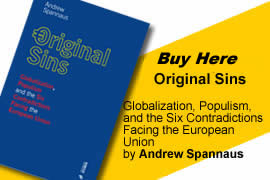The Association for Italian – Eurasian Economic Exchange (ASIG) organized a conference in Milan on November 28 on the issue of the relationship between political communication and the financial markets. The event offered the opportunity to recall one of the most egregious cases in the recent history of Italy of the use of the “markets” to impose unpopular choices, that of the famous letter from the European Central Bank (ECB) to the Italian Government on August 5, 2011.
In his speech, Andrew Spannaus recalled how from 1992 Italy’s economic situation was seen as precarious by the financial markets and decision-makers in other European countries, a view used to justify actions by a series of governments – run first by technocrats, and then by politicians – to implement a number of “structural reforms” that had profound effects on the quality of public services and levels of taxation.
The apotheosis of this method came during the crisis of 2011, when the letter signed by Mario Draghi and Jean-Claude Trichet referenced the difficulties on the markets as the reason for urgently carrying out a number of actions. The letter from the ECB started as follows:
“On August 4 the Board of Directors of the European Central Bank discussed the situation on the market for Italian state bonds. The Board believes urgent actions are necessary by the Italian authorities to restore investor trust.”
It is well-known that the actions requested included modifications to the labor market, “radical reforms” for the full liberalization of services and professions, large-scale privatizations, balancing the budget ahead of schedule, cuts to pensions, cuts to local government spending, and more. Many of these issues had already been discussed with the government of Silvio Berlusconi, but some – such as moving up the balancing of the budget – came as a surprise, putting great pressure on Italy at a very delicate time.
The conclusion of the letter returned to the justification based on the reaction of the world of finance, adding indications on how the government was to proceed:
“Considering the gravity of the current situation on the financial markets, we believe it crucial for all of the actions listed in sections 1 and 2 above to be taken as soon as possible by Decree Law, following parliamentary ratification by the end of September 2011. A constitutional reform that makes the budget rules stricter would be appropriate.”
Thus, Mario Draghi, representing an official institution of the European Union (although the ECB is not publicly owned) dictated detailed conditions to allay fears on the financial markets. And he asked that the actions be taken by decree, with ratification by the Parliament in less than two months, clearly aiming to skip over the normal political decision-making process. Some people in Italian institutions and society agreed with the reforms requested by the ECB; for most of the country, however, the effects of the policies implemented from 2011 to 2014 were harshly negative, with strong austerity programs and a consequence significant reduction of industrial production and family wealth. In this case there is no denying that public institutions used the justification of the financial markets to impose changes that otherwise would have been very difficult to obtain.
Subscribe to access all news items







December 1, 2017
English, Interventi, Notizie, Politica